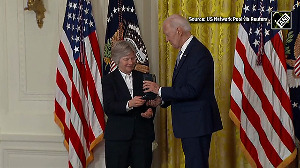Joyous scenes were witnessed at the Oval as the West Indies beat England by two wickets to win the ICC Champions Trophy and pick their first major title since the 1979 World Cup on Saturday.
Courtney Browne (35) and Ian Bradshaw (34) put on a 71-run unbeaten ninth-wicket stand to enable the Windies to win with seven balls to spare.
Even as the streetlights came on and an apparently emotionless Brian Lara watched from the dressing room, Bradshaw and Browne scripted the unlikeliest of victories.
As Bradshaw hit a superb square drive for four off Alex Wharf and punched the air in jubilation, the Windies players ran out and joined their mates in celebration.
Replying to England's total of 217, the West Indies scored 218 for 8 in 48.3 overs.
Earlier, Marcus Trescothick scored his eighth One-Day International century to enable England to post a fighting total.
For the Windies, Wavell Hinds turned in a superb spell to claim three wickets. Lara took three catches and effected a run-out.
The Windies won the toss and expectedly elected to field. Lara was not going to repeat the mistake Pakistan skipper Inzamam-ul Haq made in the semi-final when he decided to bat.
It was a cold morning, with almost a wintry feel. There were a few specks of rain, but not enough to interrupt the match.
Both teams named unchanged line-ups for the match. They had played so much cricket against each other over the last few months that every flaw, every strength, had a known quality to it.
The conditions would favour the seamers and the West Indies, in Bradshaw, Corey Colleymore and Dwayne Bravo, had the bowlers to exploit them.
England openers Trescothick and Vikram Solanki had a nervy start, but that was mainly due to the manner in which Bradshaw and Colleymore maintained a disciplined line.
After the first four overs, England had scored only 12 runs. The quick start that would have allayed their supporters' nerves never came. Instead, the Windies claimed Solanki's wicket.
Bradshaw got the left-arm seamer's default dismissal. The ball pitched on the middle and moved away with the angle. Solanki (4) pushed at it and the edge flew straight to wicket-keeper Browne. England, 12 for 1.
A huge cheer greeted captain Michael Vaughan as he walked into the middle. His performance against the Aussies in the semi-final had raised English hopes. Now they expected more of the same.
But the danger man for the West Indies was Trescothick by far. The England opener averages 63 in six matches at the Oval against his career average of 37.54 in ODIs. He does even better in Tests at the Oval, where he averages 85.85.
He showed evidence of his liking for the ground and the conditions when he slammed three boundaries off Collymore in the 10th over to push the innings run-rate above four for the first time.
But Vaughan (7) was clean bowled soon after. He tried to cut a ball that was too close to his body and only managed to play on to his stumps. (43 for 2)
Andrew Strauss was the next man in. Against the Aussies he had scored 52 off just 42 balls. He started in much the same fashion by pinching quick ones and twos. Along with Trescothick he created a kind of buzz in the middle that England needed.
At the end of the 15th over, England were 63 for the loss of two wickets.
The West Indian bowlers had done the job Lara had hoped for when he opted to field. They kept the ball in the right areas, and when you do that, wickets eventually start to fall.
Another aspect of the West Indian game on Saturday was their smart fielding. They threw themselves with abandon and that gave the bowlers a great deal of confidence. At times, it can change the very course of the match. The next two dismissals illustrated how.
First, Strauss called for a quick single just as Trescothick tapped the ball down. But he underestimated Bravo's fielding prowess. The West Indian quickly reached the ball and dislodged the bails even as Strauss (18) struggled to make his ground. England, 84 for 3.
The next wicket must have sent tremors through the English dressing room.
Andrew Flintoff, who has averaged 63 in ODIs this year, was dismissed after he had scored just three.
Wavell Hinds bowled a shortish delivery that deserved to be hit to the boundary. Flintoff swiveled and hit the ball with tremendous power. At the same instant, Lara moved with great anticipation to his left and plucked a one-handed catch inches off the ground.
Lara's catch was sheer brilliance. It was his 100th catch in ODIs. England, 93 for 4.
By the 30-over mark England were a precarious 119 for the loss of four wickets.
Paul Collingwood and Trescothick, who had reached his third half-century at the Oval, were carrying the English challenge forward.
The weather was such that even a total of around 200 would be very competitive.
One got the feeling that England needed to set their sights lower. The English batsmen needed to tread carefully and, if need be, take the runs in ones and twos till around the 45th over before they could look to play their shots.
However, Collingwood (16) decided that attack was the best policy.
He attempted to hit Hinds over mid-on, mistimed the shot. Shivnaraine Chanderpaul, at mid-on, moved backwards to take a good catch. England, 123 for 5.
Hinds was in the midst of a brilliant spell. Aided by the conditions, the medium-pacer had figures of 6-2-14-2.
It started drizzling around the 33rd over but the umpires allowed play to continue. It meant the wicket would certainly have a lot of juice even when the England bowlers came onto bowl.
Hinds' bowling figures got even better when he claimed Geriant Jones (6). The England wicket-keeper played an irresponsible shot and Lara completed another good catch. England, 148 for 6.
At the end of 40 overs, England were 152 for 6 and their hopes of setting a challenging total lay almost entirely with Trescothick, who was the only English batsman to look settled.
The England opener was dropped when on 83 in the 43rd over by 'keeper Browne. Tresocthick edged Bradshaw but a diving Browne failed to hold on to a difficult chance.
Ashley Giles, displaying a maturity that the top-order batsmen lacked, batted well at the other end. He provided stubborn resistance and played a few confident drives. That gave Trescothick the freedom to play a few more strokes.
Finally, the England innings started moving in the right direction. Trescothick received another life on 94; this time Ricardo Powell failed to hold on to a difficult chance.
Trescothick brought up his eighth ODI century, and England's 200, with a single in the 47th over. At this point he had scored exactly half of England's runs.
Trescothick didn't last long. Giles hit a ball straight to Lara. Trescothick, who had backed up too far down the wicket, failed to get back in time. England, 211 for 7.
The opener, who scored 104 off 124 balls, played an innings of great character and poise to give England a fighting chance. His 63-run partnership with Giles had been vital to England's cause.
Giles (31 off 37 balls) was dismissed a run later. Darren Gough departed after two runs were added to the total. England 214 for 9.
Another run-out and Steve Harmison was back in the hut. And, with two balls to spare, the Windies wrapped up the England innings on 217.
The writing was on the wall for England: get wickets or you will end up one short once again. In the end, it turned out to be two short.
Nine of the last 11 West Indies ODI victories have come while batting second. So this is certainly a team that knows how to chase.
For the first three overs the England bowlers struggled with the exaggerated movement they were getting. Gough, for a bowler of his experience, surprisingly sprayed the ball all over the place. Harmison looked lethal when he managed to pitch the ball on the spot.
Harmison got the first breakthrough when Solanki took a good catch to send Hinds (3) back in the fourth over. West Indies, 19 for 1.
Ramnaresh Sarwan, who was later named man-of-the-tournament, walked in next, but never really settled down. A beauty from Flintoff opened him up and Andrew Strauss took one of the most brilliant catches you will ever see at second slip -- diving full stretch to his right and holding on to the ball with his outstretched hand. Windies, 35 for 2.
Chris Gayle (23 off 33 balls), who played some spanking drives straight down the wicket, was the next to go. A short ball from Harmison climbed onto the left-hander too quickly; the attempted hook ended up safely in the hands of the bowler who completed an easy caught and bowled. Windies, 49 for 3.
The West Indies hopes now lay with that trusted firm of Lara and Chanderpaul. The Trinidadian and Guyanese set about trying to get the innings back on track. But it didn't go off too well.
After 23 runs were added an inspired Flintoff got Lara (14) to edge one to 'keeper Jones. The rain and moisture had given Freddy Flintoff just the encouragement he needed. As he has so many times during the summer, he claimed Lara's vital wicket for England. Windies, 72 for 4.
The Windies surprisingly sent Bravo (0) and Ryan Hinds (8) ahead of Powell. Both batsmen were removed in identical fashion by Flintoff and Trescothick respectively. Windies, 114 for 6.
Powell, for all the talent he has, is often accused of giving away his wicket very easily.
Today we saw another example of this.
After having scored 14 off 15 balls, Powell, in a moment of madness, hit Collingwood straight to Trescothick, who made no mistake. Windies, 135 for 7.
Vaughan pressed every medium-pacer he had into the attack.
The problem was that Flintoff and Harmison had only five overs left between them. Vaughan needed to get 13 overs out of the others bowlers or get all the wickets.
The England skipper saved himself some headache when he caught an easy catch at short extra cover off Collingwood and sent the stubborn Chanderpaul back to the pavilion.
Chanderpaul scored 47. He had held the Windies innings together like he often does. Windies, 147 for 8.
Seventy-two runs were needed and with only two wickets in hand, not even the most optimistic of West Indian supporters would have contemplated victory.
But England underestimated the opposition and relaxed.
At first, Bradshaw and Browne looked like all they wanted to do was survive; just survive. Slowly, they found their footing and played a few shots. England and Vaughan were still not concerned.
By the 45th over, Vaughan had run out of options as Harmison and Flintoff finished their quota of overs. He turned to Gough, but the veteran disappointed once again. With every run, the tension grew.
Closer and closer to the target, both batsmen grew more comfortable at the wicket. The fading light was not a deterrent any longer.
When Bradshaw slammed that boundary for victory, with seven balls remaining, the Oval erupted in tribute.
Bradshaw (35 off 55 balls) and Browne (34 off 51) had given the Windies a well-deserved victory.
It was a dream final, no cricket fan will ever forget.







 © 2025 Rediff.com -
© 2025 Rediff.com -